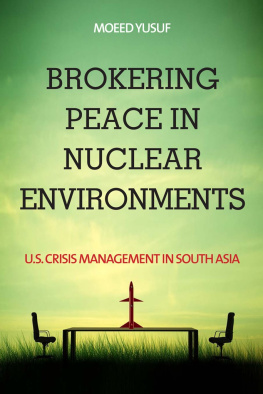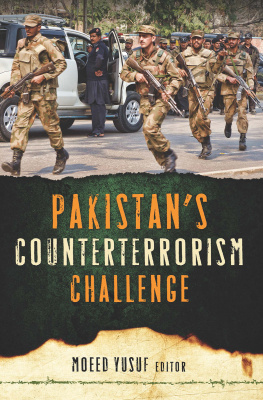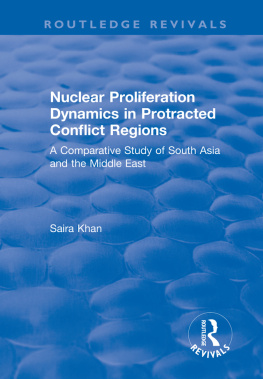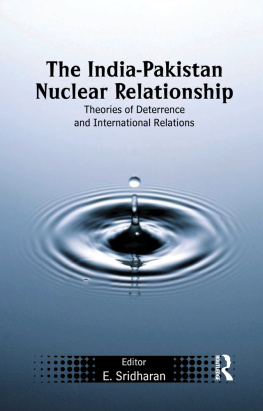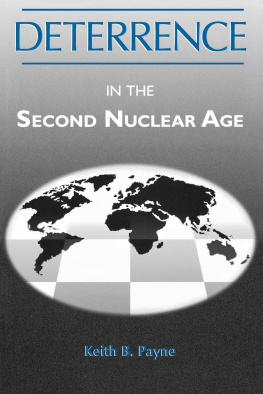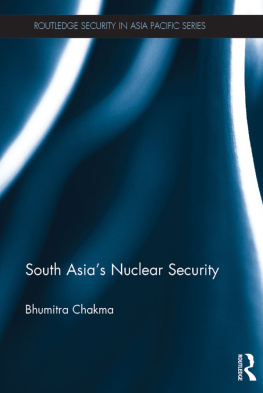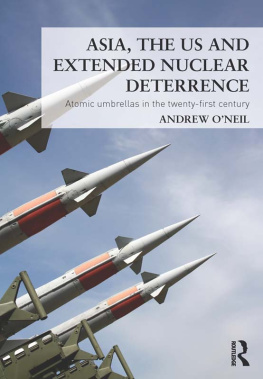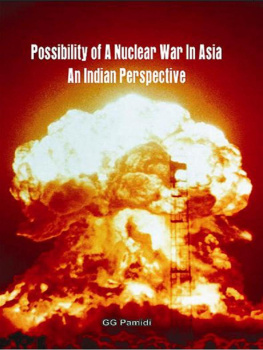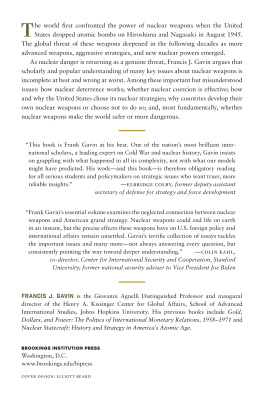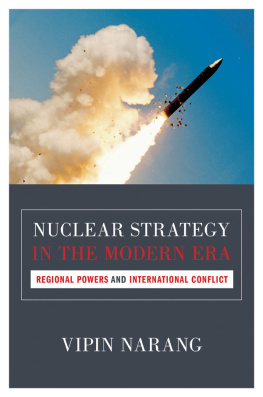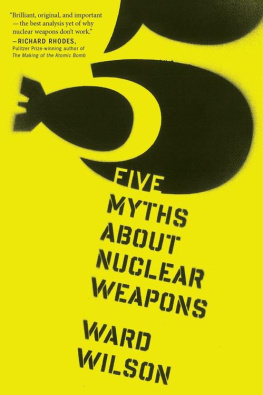Stanford University Press
Stanford, California
2018 by the Board of Trustees of the Leland Stanford Junior University.
All rights reserved.
No part of this book may be reproduced or transmitted in any form or by any means, electronic or mechanical, including photocopying and recording, or in any information storage or retrieval system without the prior written permission of Stanford University Press.
Printed in the United States of America on acid-free, archival-quality paper
Library of Congress Cataloging-in-Publication Data
Names: Yusuf, Moeed, author.
Title: Brokering peace in nuclear environments : U.S. crisis management in South Asia / Moeed Yusuf.
Description: Stanford, California : Stanford University Press, 2018. | Includes index.
Identifiers: LCCN 2017050825 (print) | LCCN 2017055156 (ebook) | ISBN 9781503606555 (ebook) | ISBN 9781503604858 (cloth : alk. paper)
Subjects: LCSH: Nuclear crisis controlSouth Asia. | Crisis managementUnited States. | Nuclear warfareIndiaPrevention. | Nuclear warfarePakistanPrevention. | United StatesForeign relationsIndia. | IndiaForeign relationsUnited States. | United StatesForeign relationsPakistan. | PakistanForeign relationsUnited States. | IndiaForeign relationsPakistan. | PakistanForeign relationsIndia.
Classification: LCC JZ6009.S64 (ebook) | LCC JZ6009.S64 .Y87 2018 (print) | DDC 327.1/7470954dc23
LC record available at https://lccn.loc.gov/2017050825
Cover design: Tandem Creative
Acknowledgments
THIS BOOK HAS HAD A LONG JOURNEY. ITS GENESIS lies in a paper I wrote back in 2003 on the 20012002 India-Pakistan military standoff. The paper left me unsatisfiedwith myself for not being able to fully rationalize crisis behavior in light of the Cold Warera literature that continued to inform scholarship on the subject, but even more so with this body of literature itself. Something was missing; I didnt quite know what. This something kept me intrigued, but it was not till 2007 that I was able to crystallize the intellectual puzzle in my mind: the missing piece, I realized, was a deep dive into the role of external actors in influencing nuclear crisis behavior. Cold War literature was largely silent on these third-party roles. The puzzle became a passion and, today, the journey has culminated in this bookan attempt to articulate an original theory of crisis behavior that is centered on third-party mediation in regional nuclear settings.
This work would not have been possible without the constant encouragement and support of my mentors, peers, assistants, and family and friends. Four individuals deserve special mention. Each of them has had a larger-than-life role in my professional development. Adil Najam at Boston University is the reason for my professional existence. Without him, this book, and much else, would have been impossible. Words cannot express my gratitude for his constant mentoring and trust in me. No one has looked out for me and promoted me more than Ejaz Haider, Pakistans strategic expert par excellence and my first newspaper editor. Ejaz picked me up as a twenty-something nobody and taught me to think, write, and speak like a strategist. He has been my sounding board for all things related to international relationsand I could not have had a better one. Stephen Cohen, the legendary American expert on Pakistan, was my first boss in the field. Steve has trained hundreds of scholars over the years, but my bond with him has been special. Through thick and thin, Steve has been the anchor that has kept me moored despite the rough seas of Washingtons policy circuit. But for Steve, I may not have persevered with my interest in the policy world I belong to today. Finally, Ali Sultan, my childhood friend, sparring partner, and uncompromising critic. He has been there for me in the best and worst of timesand this book saw both.
I started researching for this book in earnest in 2009. I wish to thank Timothy Crawford and Sophia Perez for their guidance and advice. Tim has been especially crucial to this project. His seminal work, Pivotal Deterrence: Third-Party Statecraft and the Pursuit of Peace, and my many conversations with him provided the building blocks for this endeavor. This project traveled with me to the U.S. Institute of Peace (USIP) in 2010. USIP has been a fantastic professional home for me ever since. Even though this book was not part of my USIP portfolio per se, I was extremely fortunate to have unconditional support and encouragement from the institutes leadership. I owe special gratitude to my colleague, friend, and inspiration, Andrew Wilder, who allowed me the flexibility to complete this book while working full-time at the institute. There is absolutely no way it would have been completed without his understanding, and for thisand much moreI shall remain indebted to him.
Parts of the book rely on primary information gleaned from interviews of senior American, Indian, and Pakistani interlocutors. I am grateful to the interviewees for their willingness to speak to me, and to colleagues and friends who helped arrange these conversations. The Delhi Policy Group in New Delhi, India, convened a special roundtable with senior Indian ex-officials and experts to discuss my project. I am also grateful to Peter Jones and Nicole Waintraub, organizers of the Ottawa Dialogue Track II process between India and Pakistan, and to Feroz Hasan Khan, a frequent convener of table-top exercises involving Indians and Pakistanis under the auspices of the U.S. Naval Postgraduate School, for inviting me to their deliberations as these settings created avenues for several of my interviews. I also wish to thank Happymon Jacob, Ajay Darshan Behera, General Aditya Singh, and Brigadier Arun Sahgal for the hospitality and networks they offered during my research trip to India.
Many scholars and practitioners were kind enough to read and reread parts of the manuscript for this book at various stages. I am grateful to all of them. Without their feedback, the book would not have attained its true depth and perspective. In addition to Stephen Cohen, Ejaz Haider, and Tim Crawford, I must mention Dinshaw Mistry at the University of Cincinnati and Jason Kirk at Elon University, who became my go-to people for impressions of the work along the way. Jack Gill at the U.S. National Defense University, my USIP colleague Colin Cookman, Rabia Akhtar at the University of Lahore, Arsla Jawaid, and Happymon Jacob at the Jawaharlal Nehru University also provided valuable feedback toward the end of the project. The input of all these individuals is responsible for drastic improvements to earlier drafts of the book. So is the feedback I received from the anonymous reviewers who evaluated the manuscript.
Throughout this project, I have been fortunate to receive substantive and administrative assistance from very diligent and able research associates. Eric Auner, Huma Rahman, Muhammad Faisal, Abhay Kumar, and Shalini Prasad all helped advance the project at different points. Shahzad Atta deserves special praise for supporting me over the past four years through meticulous research, fact checking, data collation, and editing. Together, we regularly burned the midnight oil. He complained and groaned but never let me down. Equally crucial for my sanity was my friend Arshad Khurshid, who has gone through this manuscript more than anyone but me. As someone who is technologically challenged to the core, I cannot overstate the importance of his support in preparing the illustrations in this book, formatting the work, and ensuring data consistency and security. I am also grateful to Ahmet Selim Tekelioglu, Pamela Aall, and Lauren McNally for making important reference material available to me in the last stages of the project.

